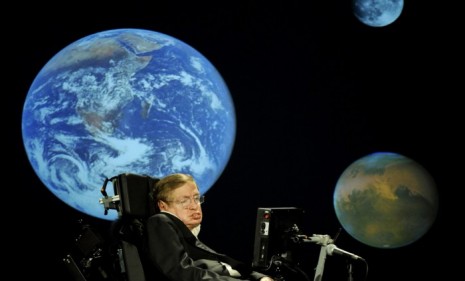Stephen Hawking: Humans will go extinct without space travel
"Spread out into space" or disappear entirely, the celebrated scientist warns his fellow earthlings

A free daily email with the biggest news stories of the day – and the best features from TheWeek.com
You are now subscribed
Your newsletter sign-up was successful
Stephen Hawking, the eminent theoretical physicist, made headlines earlier this year by advising against any attempt to contact aliens. Now, he has suggested our survival as a species depends on colonizing other planets. (Listen to Hawking's claims.) A guide to Hawking's latest grim prophecy:
Why does humanity's future lie in outer space?
Because "great dangers" face the human race over the next two centuries, Hawking told delegates at a Big Think conference. With finite resources on earth and humankind's "aggressive" genetic instincts, our "only chance of longterm survival" may be to "spread out into space."
The Week
Escape your echo chamber. Get the facts behind the news, plus analysis from multiple perspectives.

Sign up for The Week's Free Newsletters
From our morning news briefing to a weekly Good News Newsletter, get the best of The Week delivered directly to your inbox.
From our morning news briefing to a weekly Good News Newsletter, get the best of The Week delivered directly to your inbox.
Is Hawking the first to deliver such a message?
Not at all. Rocket science pioneer Konstantin Tsiolkovsky warned as long ago as 1895 that while "earth is the cradle of humankind... one cannot live in the cradle forever." Carl Sagan and Arthur C. Clarke also both made similar predictions.
Where would we go?
"Mars would offer the best nearby second home for humanity and our allied species," says Alan Boyle at MSNBC. In the long term (that is, in the next few billion years) humankind will have to escape the inner sector of our solar system before the sun begin expanding dramatically in its final stages of life.
A free daily email with the biggest news stories of the day – and the best features from TheWeek.com
How should we go about escaping planet Earth?
Hawking says the first step — the one we should be concerned with at the moment — is much greater investment in manned space flight.
Isn't Hawking being a bit too gloomy?
He certainly is, say the editors at the Calgary Herald. Hawking's "glass-half-empty view of humankind" is "defeatist." It's insulting to argue we don't have the ability to save ourselves. Not so, says Andrew Moseman at Discover magazine. Hawking is "pushing urgency and vigilance, not gloominess... He's just the kind of person who thinks on the long, long term."
Sources: Discover, Huff Po., MSNBC, Calgary Herald
-
 The ‘ravenous’ demand for Cornish minerals
The ‘ravenous’ demand for Cornish mineralsUnder the Radar Growing need for critical minerals to power tech has intensified ‘appetite’ for lithium, which could be a ‘huge boon’ for local economy
-
 Why are election experts taking Trump’s midterm threats seriously?
Why are election experts taking Trump’s midterm threats seriously?IN THE SPOTLIGHT As the president muses about polling place deployments and a centralized electoral system aimed at one-party control, lawmakers are taking this administration at its word
-
 ‘Restaurateurs have become millionaires’
‘Restaurateurs have become millionaires’Instant Opinion Opinion, comment and editorials of the day